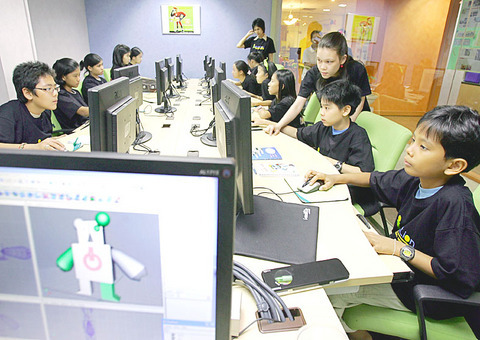An animated feature film about an abandoned elephant that saves Thailand from an invasion is spearheading the country's push into the multi-billion dollar global animation industry.
Thailand is banking on the success of the movie, which is being released in Asian cinemas this month, as it prepares its challenge to longtime powerhouses Japan and South Korea as the capital of Asian animation.
"The animation industry in Thailand is much more developed than in Singapore and Malaysia, where no feature animation film has been made," said Auchara Kijkanjanas whose company made the 90-minute movie called Khan Kluay.

PHOTO: AFP
"We have seen significant developments in Thailand recently in terms of craftsmanship and creativity," said Auchara, vice-president of Kantana Animation.
Costing 150 million baht (US$3.4 million), the 3D movie whose name means "pretending to ride a horse on a banana leaf," was the first produced entirely in Thailand.
Auchara hopes the flick, plus the investment in Bangkok's annual international film festival which began in 2003, will focus attention on Thailand and its plan to become a low-cost base for producing quality animation.
More than 90 percent of animation for films and television shows in the US is produced in Asia, mainly in Japan and South Korea. India and China are also emerging as a regional rivals.
With five major animation companies already operating, Thailand is vying for a slice of that market by becoming an alternative outsourcing destination for Hollywood and European animation projects.
"Global outsourcing has moved from North America and Europe to the Asia-Pacific where producers offer cheaper production costs and competitive wages for almost the same quality of animated products," said an analyst from the Kasikorn research firm, which has investigated the market for Thailand's industry.
Thailand has already made solid inroads, selling television cartoon series to China and South Korea where they have proved popular.
Chinese cable channel CCTV is interested in co-producing one of the next series for its subscribers, said Santi Laohaburanakit, managing director of Vithita, the firm that made them.
Thailand also aims to become a leader in animation software, cashing in on a growing demand for the technology in computer games and mobile phones as well as in movies. Animated content accounts for 12 percent of the global digital content market and is expected to be worth US$271.3 million next year.
Research conducted for the industry estimates the export value of Thailand's software will reach 80 billion baht by 2008. But Thailand faces tough challenges in its battle for market share as India is expected to sign US$950 million in outsourcing contracts alone with Hollywood animation houses for delivery by 2009.
And Japan, which produces 60 percent of the world's animation, has moved into China, seen as a burgeoning market for animation.
Thailand's industry is rallying though and the government has promised to help. The stock Market for Alternative Investment signed a memorandum of understanding with the government's Software Industry Promotion Agency to promote Thailand as the "Hollywood of Asia" in the digital content industry.

DEFENDING DEMOCRACY: Taiwan shares the same values as those that fought in WWII, and nations must unite to halt the expansion of a new authoritarian bloc, Lai said The government yesterday held a commemoration ceremony for Victory in Europe (V-E) Day, joining the rest of the world for the first time to mark the anniversary of the end of World War II in Europe. Taiwan honoring V-E Day signifies “our growing connections with the international community,” President William Lai (賴清德) said at a reception in Taipei on the 80th anniversary of V-E Day. One of the major lessons of World War II is that “authoritarianism and aggression lead only to slaughter, tragedy and greater inequality,” Lai said. Even more importantly, the war also taught people that “those who cherish peace cannot

Taiwanese Olympic badminton men’s doubles gold medalist Wang Chi-lin (王齊麟) and his new partner, Chiu Hsiang-chieh (邱相榤), clinched the men’s doubles title at the Yonex Taipei Open yesterday, becoming the second Taiwanese team to win a title in the tournament. Ranked 19th in the world, the Taiwanese duo defeated Kang Min-hyuk and Ki Dong-ju of South Korea 21-18, 21-15 in a pulsating 43-minute final to clinch their first doubles title after teaming up last year. Wang, the men’s doubles gold medalist at the 2020 and 2024 Olympics, partnered with Chiu in August last year after the retirement of his teammate Lee Yang

The Philippines yesterday criticized a “high-risk” maneuver by a Chinese vessel near the disputed Scarborough Shoal (Huangyan Island, 黃岩島) in a rare incident involving warships from the two navies. The Scarborough Shoal — a triangular chain of reefs and rocks in the contested South China Sea — has been a flash point between the countries since China seized it from the Philippines in 2012. Taiwan also claims the shoal. Monday’s encounter took place approximately 11.8 nautical miles (22km) southeast” of the Scarborough Shoal, the Philippine military said, during ongoing US-Philippine military exercises that Beijing has criticized as destabilizing. “The Chinese frigate BN 554 was

US Secretary of the Treasury Scott Bessent and US Trade Representative Jamieson Greer began talks with high-ranking Chinese officials in Switzerland yesterday aiming to de-escalate a dispute that threatens to cut off trade between the world’s two biggest economies and damage the global economy. The US delegation has begun meetings in Geneva with a Chinese delegation led by Chinese Vice Premier He Lifeng (何立峰), Xinhua News Agency said. Diplomats from both sides also confirmed that the talks have begun, but spoke anonymously and the exact location of the talks was not made public. Prospects for a major breakthrough appear dim, but there is